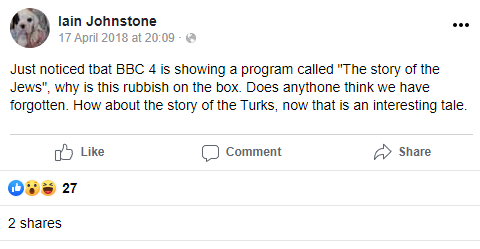Gallery Home – Religious antisemitism – Classic stereotypes – Holocaust – Jews, Israel and Zionism – Conspiracy – Erasure
Example 18: Holocaust denial and minimisation:
Holocaust denial is unfortunately an extremely common form of antisemitism today. Just as the dedicated antisemite finds it necessary to blame Jews for what is most wrong with the world, so they also find it necessary to deny or minimise the Holocaust, the most appalling consequence of antisemitism, in order to minimise the sympathy of non-Jews for Jews and keep antisemitism alive.
Holocaust deniers use the term ‘Holocaust revisionism’ to suggest that their questioning of accepted historical facts is a legitimate form of historical inquiry. In fact, although history is of course always being added to and revised, the basic facts about the Holocaust are so well-documented that to question them is simply illegitimate.
The Holocaust (from the Ancient Greek word “holokaustos” and the Hellenic “holokautoma”, literally “the burning of the whole”, which was used to translate the Olah sacrifice in the Torah, and is still used in Greek today for an all-consuming inferno) is generally regarded as starting in earnest in 1941, and culminated in the industrial-scale murder, mostly by gassing, of millions of Jews, but also Roma/Gypsies, homosexuals, Jehovah’s Witnesses, trade unionists, Communists, Socialists, black people, disabled people and others deemed unworthy of life by the Nazi regime. Although other regimes – within living memory they include Stalin’s in the USSR and Pol Pot’s in Cambodia – have also committed genocide, there is in recent history no comparable instance of the premeditated mass-slaughter of people solely on the basis of their ethnicity.
Holocaust deniers claim, for example, that Nazi Germany’s Final Solution aimed only to deport Jews, not to exterminate them; or that they did not use extermination camps and gas chambers for this purpose; or that they did, but that the actual number of Jews murdered is much lower – around 500,000 – rather than the accepted figure of 5 to 7 million. This is despite survivors’ testimony, film evidence and the Nazi’s own records. Some, like David Irving, claim the slaughter took place without the knowledge of Hitler.
All Holocaust denial or minimisation is antisemitic; we are dealing with incontrovertible historical facts, not a variety of opinions all of which have some validity. Unbelievably, Norman Finkelstein here seems to suggest that Holocaust denial should be taught at university as a serious alternative view.
https://twitter.com/Mendelpol/status/1319529014613151744/photo/1
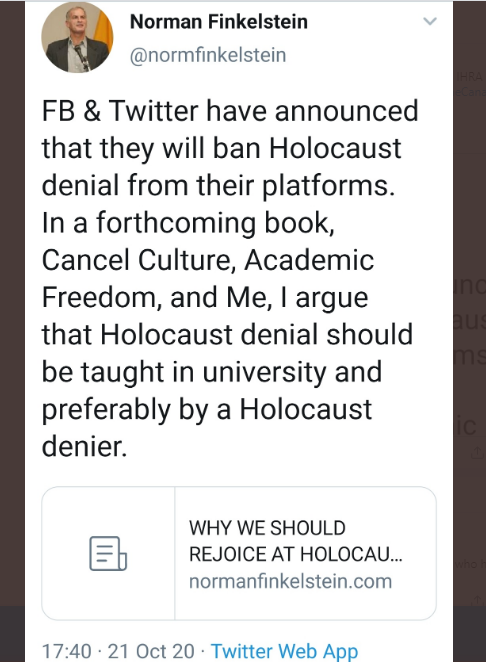
https://www.facebook.com/photo.php?fbid=10158885273098219&set=p.10158885273098219&type=3&theater
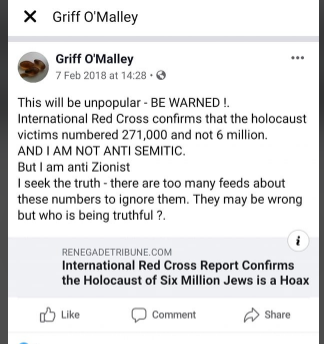
This is an account of an action by the far right in Boulder, Colorado, in November 2019. Highly antisemitic notes were posted around a pedestrian mall, and this flier was handed out.
Another twist to Holocaust minimisation is linked to the notion that the Israeli government – or ‘Zionists’ – exploit the history of the Holocaust by continuing to portray Jews as victims while simultaneously victimising the Palestinians. ‘Zionists’ are said by some antisemites to exaggerate the number of Holocaust victims – or even invent the Holocaust altogether – to further their aims.
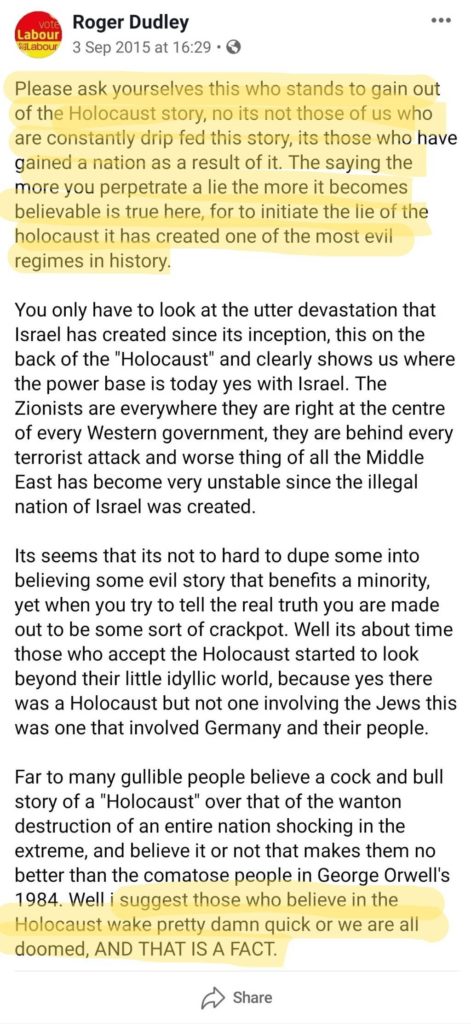
Example 19: Blaming Jews (or Zionists) for the Holocaust:
If antisemites can blame Jews for all world ills, it follows that they can even blame Jews for causing the greatest disaster to their people – the Holocaust. Needless to say, there is no truth at all to this charge. However, different arguments and conspiracy theories have been applied in support of it.
We will discuss conspiracy theories about the Rothschild banking family in the Conspiracy section of this Gallery. Here, the Rothschilds are blamed for funding the fledgling Nazi party, and accused of making a profit out of the Holocaust.
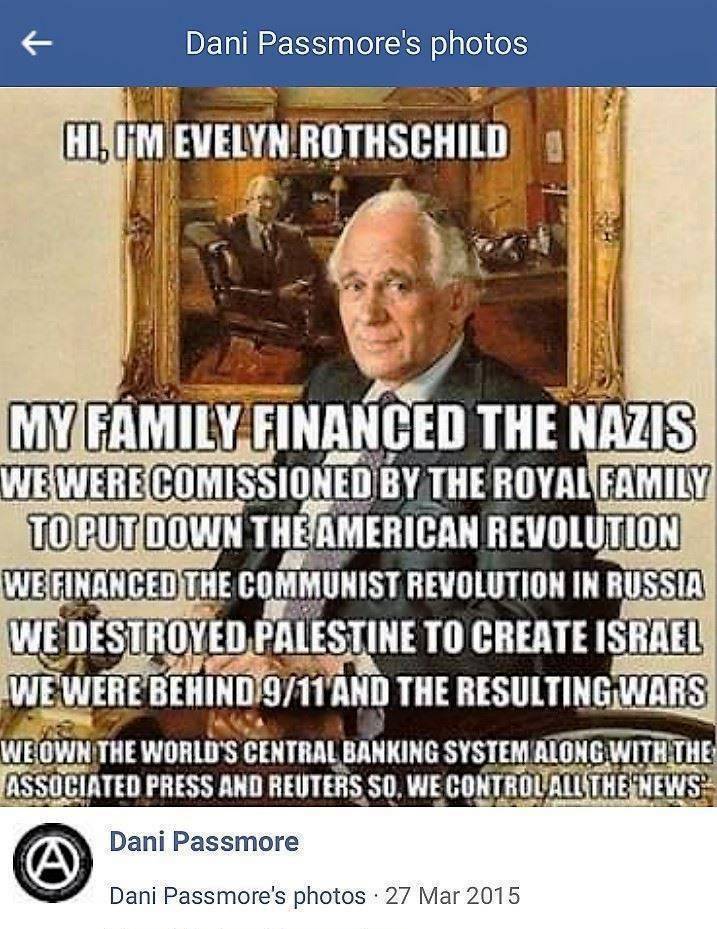
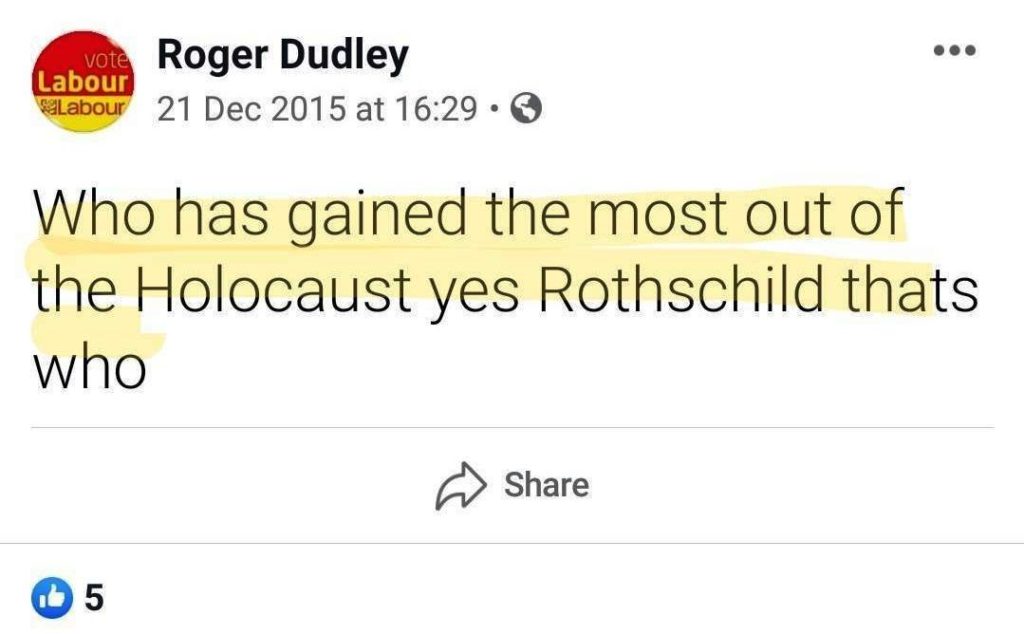
We also cover David Icke’s grand conspiracy theories elsewhere. In his worldview, a small Jewish clique worked with non-Jews to create both world wars and the Russian Revolution and financed Hitler’s rise to power and rearmament. The Jewish clique was the ‘Illuminati’, a reptilian alien race promoting ‘Rothschild-Zionism’.
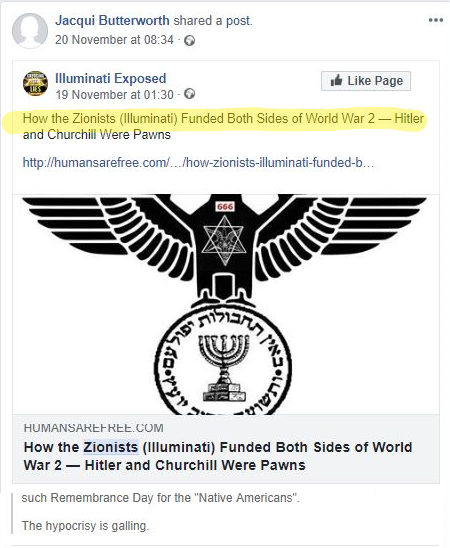
In the conspiracy theory propounded by Frances Leader, of which we select extracts below, it is claimed that the Rothschilds were Khazars, ‘bogus Jews’ (see The Khazar myth in the Erasure section), whose attempts to control German finance enraged Hitler, so that he was ‘misled’ into punishing the whole Jewish people as a result. He is therefore said to have put them into concentration camps in order to push them into wanting to go to Israel. The ultimate aim of the Khazar Zionists is a nuclear Armageddon survived only by Israeli Khazar Zionists in the bunkers. The conspiracy theory is indeed ‘mad as a box of frogs’, but the hatred of Jews here – described as the product of ‘1000 years of hatred and inbreeding’ – is unmistakeable. The more general belief, as summed up absurdly by Robin Scott, who is also a Holocaust minimiser, is that Jews always ‘cause trouble’, and that is why they were persecuted.
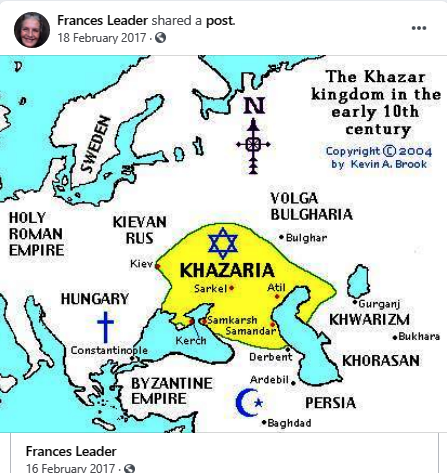
…..
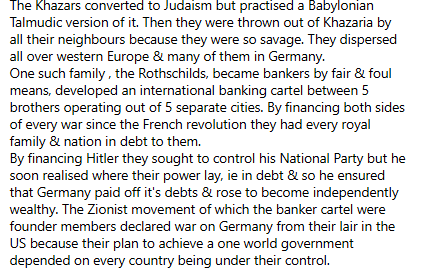
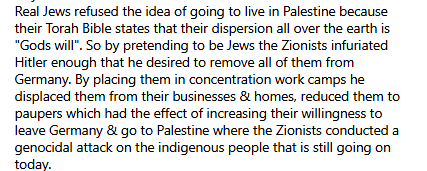
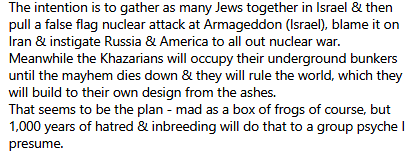
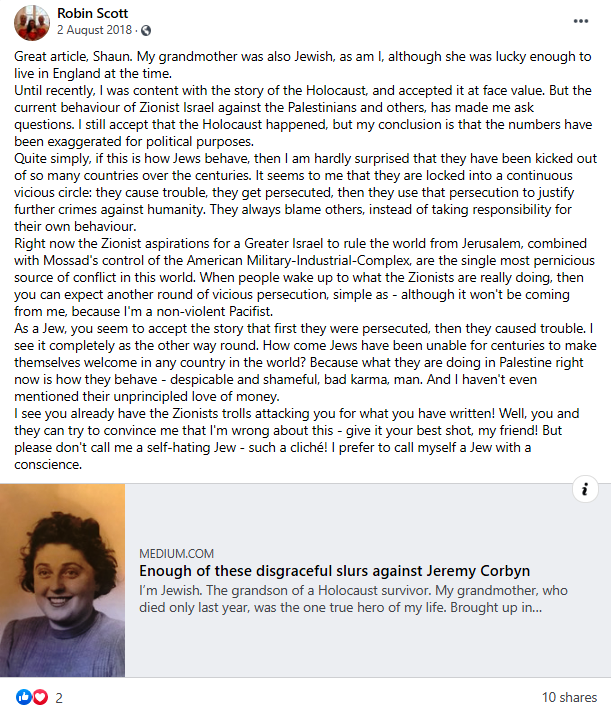
In the last example, Zionists specifically were portrayed as responsible for the Holocaust. This demonises Zionist Jews for betraying fellow-Jews, a kind of ‘divide and rule’. Another way of blaming Zionists is to state that they co-operated with Hitler in the Haavara Agreement – we will cover this in the Jews, Israel and Zionism section; this wrongly implies that German Zionists were somehow on an equal level of power with the Nazis, and therefore responsible for Nazi persecution. It has even been suggested that antisemitism itself was a ‘Zionist’ construct invented to scare people into leaving Europe for Israel, even though antisemitism obviously predates the foundation of the state of Israel. Zionists have also been accused of failing to rescue sufficient Jews from the Nazis. It has been said for example that the Board of Deputies ‘should apologise for responsibility for incalculable loss of Jewish life in the Holocaust’.
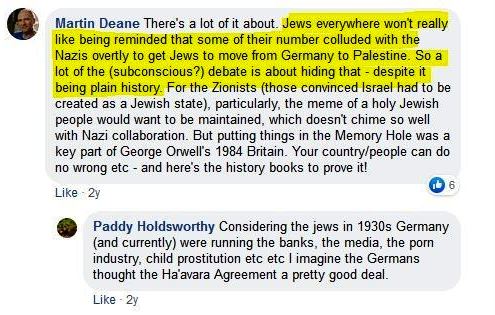
mm
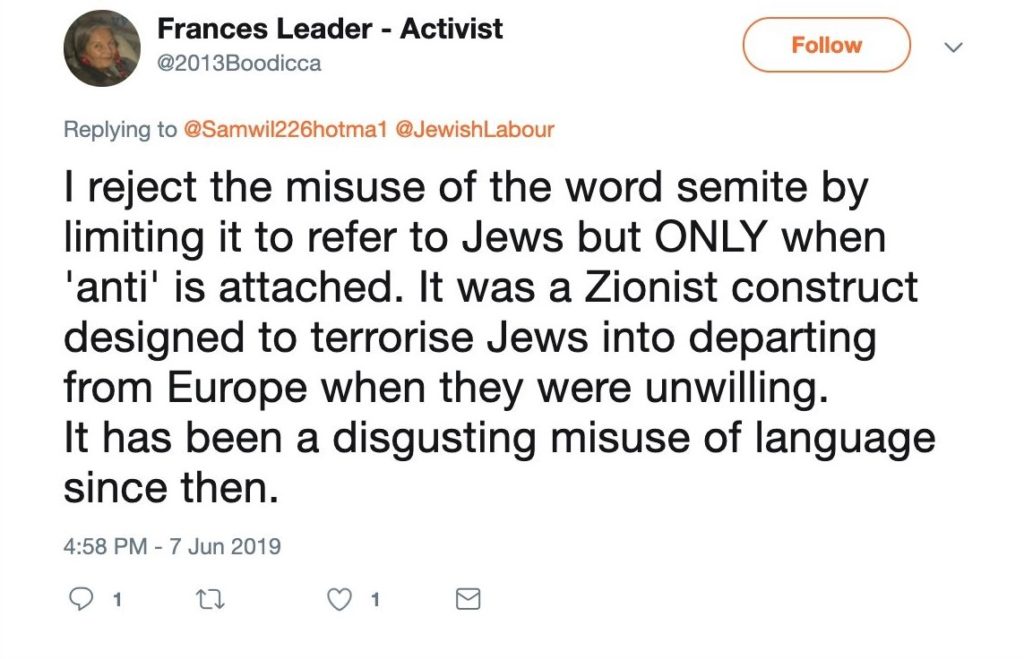
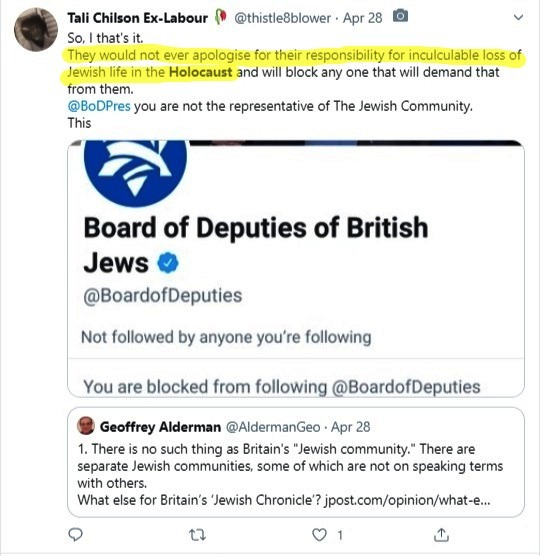
Following the Holocaust, Zionists outside Europe have been blamed for ‘not being there to help’ at the Holocaust – as if they could have helped – yet also for calling the victims ‘cowards’. Or alternatively, it is claimed that thousands of Jews claimed to have died in the Holocaust had in fact gone to Israel, and that Israel then unfairly demanded retribution (compensation from Germany) for them (#Hanif). Further, Zionists are seen as exploiting the Holocaust ‘story’ to justify the actions of the Israeli government, and by exaggerating the number of victims. (Roger Dudley)
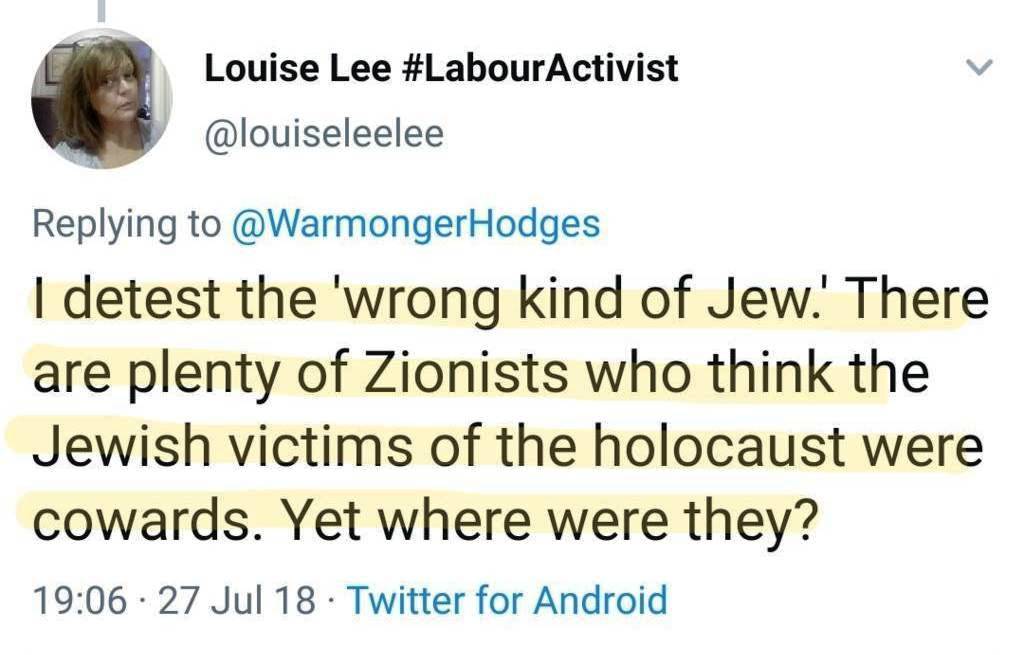
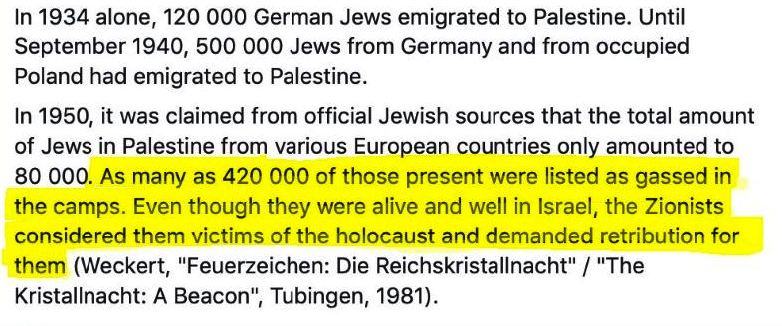
Example 20: Holocaust inversion:
Lesley Klaff writes “What has been called ‘Holocaust Inversion’ involves an inversion of reality (the Israelis are cast as the ‘new’ Nazis and the Palestinians as the ‘new’ Jews), and an inversion of morality (the Holocaust is presented as a moral lesson for, or even a moral indictment of ‘the Jews’).” https://fathomjournal.org/holocaust-inversion-and-contemporary-antisemitism/
Unless someone of Jewish origins has explicitly expressed admiration for Nazi ideology and practice, it is never acceptable to use the word ‘Nazi’ when referring to Jewish people, or make direct comparisons between Jews and Nazis. Other adjectives and epithets should used instead – the word ‘fascist’ can be perfectly acceptable when it is appropriate (as it occasionally is). This is because the central feature of Nazi ideology, one which Hitler himself passionately believed in, was that Jews were uniquely evil, were responsible for pretty much all the ills of the world, and must be singled out for special treatment (as in the Nazi Party’s original policy statement, which stated ‘no Jew to be a German’, a status not accorded to any other ethnic or religious minorities). Antisemitism’s centrality to Nazi ideology makes it distinct from other ideologies, even those with strong similarities such as, for example, Mussolini-style fascism.
It is not just inaccurate, but deeply hurtful and offensive to Jews to call them by the name of the Nazis who were responsible for decimating their population in the most horrible ways. It is very possible to find other, and very vehement words, to criticise the State of Israel’s actions towards the Palestinians, without needing to invoke the Holocaust or Nazis, or indeed to suggest, as in this first example, that Jews should have learned from the Holocaust and be better than others because they have suffered, but instead have become perpetrators. As Marlon Solomon has wryly remarked, the Holocaust was not a university.
https://www.facebook.com/photo.php?fbid=10158881369458219&set=p.10158881369458219&type=3&theater
Example 21: Holocaust comparisons:
Because the Holocaust was such a supremely evil and large-scale genocide, sometimes those who wish to denounce other losses of life refer to them as ‘a Holocaust’, or as equivalent to the Holocaust in terms of evil and loss of life. It is particularly common to compare the many lives lost to Israeli military action in Palestine to the mass-murder of the Jews, but other comparisons are not uncommon either, such as such as anti-abortionists referring to “The Abortion Holocaust”, or animal rights activists describing a “Holocaust on Your Plate’.
These comparisons are to be avoided; however awful the loss of lives are in many parts of the world, and whatever other dreadful things sometimes happen, the Holocaust or, as it is often called by Jews, the Shoah (Hebrew for ‘calamity’ or ‘destruction’) was such a monstrous event that it renders these comparisons not only inaccurate, but actually offensive not only to all Jews – especially to the large proportion of living Jews who lost relatives in the Holocaust – but also to the other groups mentioned above which lost members in the Holocaust (N.B. to be quite clear, SAAS do not regard abortion as a ‘dreadful thing’.)
We do not in general regard comparisons between the Shoah and slavery in the USA and other countries as inappropriate, however, although the methods used were in many respects different. There was an immense loss of life and African culture through slavery, and the full extent is only now being brought to light. The issue of how other genocides is memorialised is an ongoing debate, but that debate should never suggest that Jews and other Holocaust victims are making too much of what happened.
To sum up so far: to many Jews (and members of other groups and ethnicities that suffered in the Holocaust) denial, minimisation, revisionism or false comparisons with regard to it are even more offensive and upsetting than other forms of antisemitism or discrimination.
https://worldanimalsvoice.com/2020/10/15/the-holocaust-on-your-plate-campaign-is-lawful/
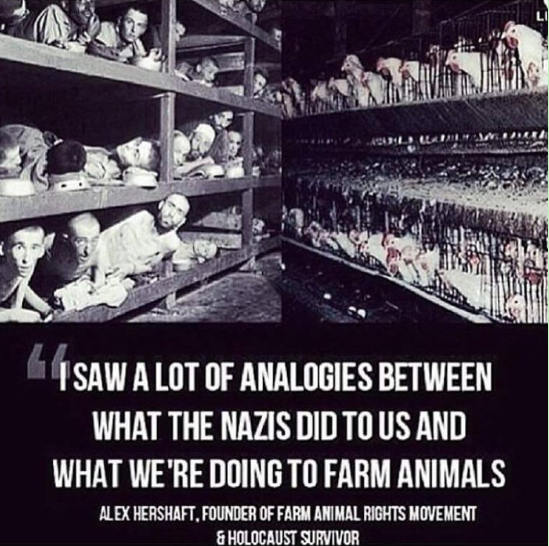
Example 22: Trivialising or mocking the Holocaust, or any other historical example of Jewish suffering:
Trivialising the Holocaust is a phenomenon which is very usual in discourse in many countries of the world; if something is undesirable even to a relatively trivial degree, it is often compared to the Nazis. Unfortunately, we frequently hear of ‘grammar Nazis’ or (a phrase which we find particularly obnoxious) ‘feminazis’. But the direct mocking of the plight of the victims of the Holocaust is, mercifully, rare although sadly not entirely non-existent. Here is one example.
The first picture shows a carnival parade in Campo de Criptana, south of Madrid, Spain, in February 2020. Behind these dancing men in their fake Nazi uniforms were people dressed in striped outfits designed to look like concentration camp clothing. Although permission was granted as a commemoration, the light-hearted treatment was utterly offensive. This is not something that can be described as a common phenomenon, and indeed would have been illegal in some countries, including Germany, where dressing up in Nazi clothing is prohibited other than for bona fide historical drama and other purely educational purposes; but a somewhat similar occurrence was seen in Aalst, Belgium some months earlier, where Orthodox Jews were caricatured ‘just for fun’ (see second picture).
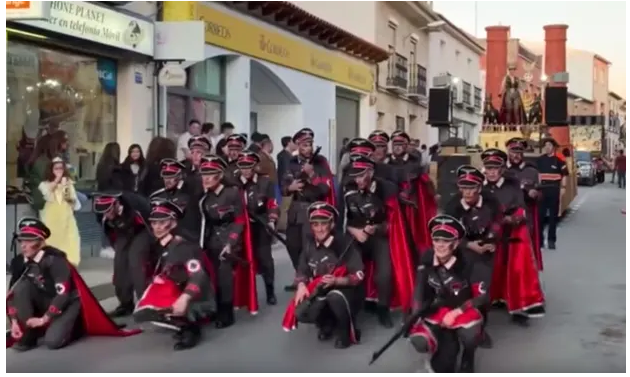
https://www.bbc.co.uk/news/world-europe-51612541
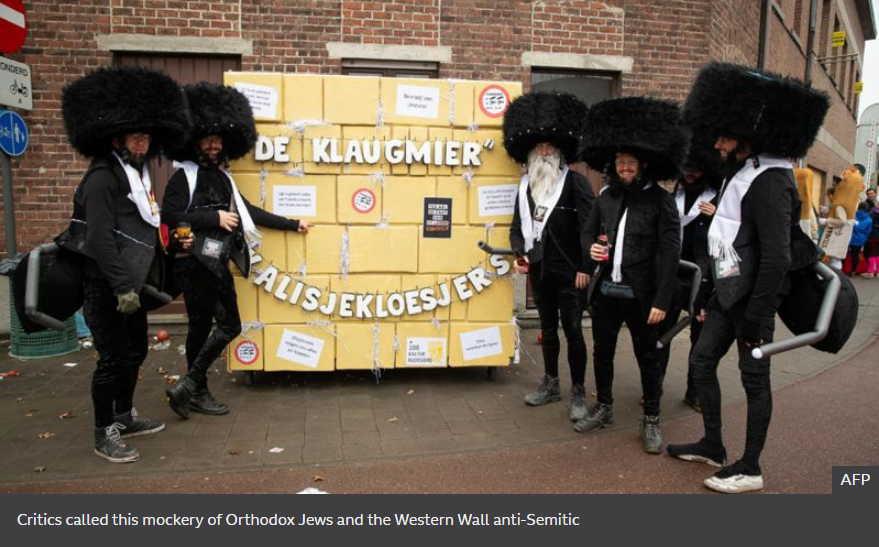
The further examples below are of individuals trivialising the Holocaust. There has been a TikTok trend for young people to post videos of themselves dressed as Holocaust victims. For some this may be an attempt to imagine themselves into this situation, for others it is just a fashionable game. The person who photographed a rubber duck in front of his holiday snaps and did not desist when he reached Auschwitz has in fact subsequently apologised. Auschwitz is not a suitable subject for this sort of humour, even if it is just an attempt to cope with the distress caused by witnessing the camp. The problem is that such images are rapidly spread widely by social media.
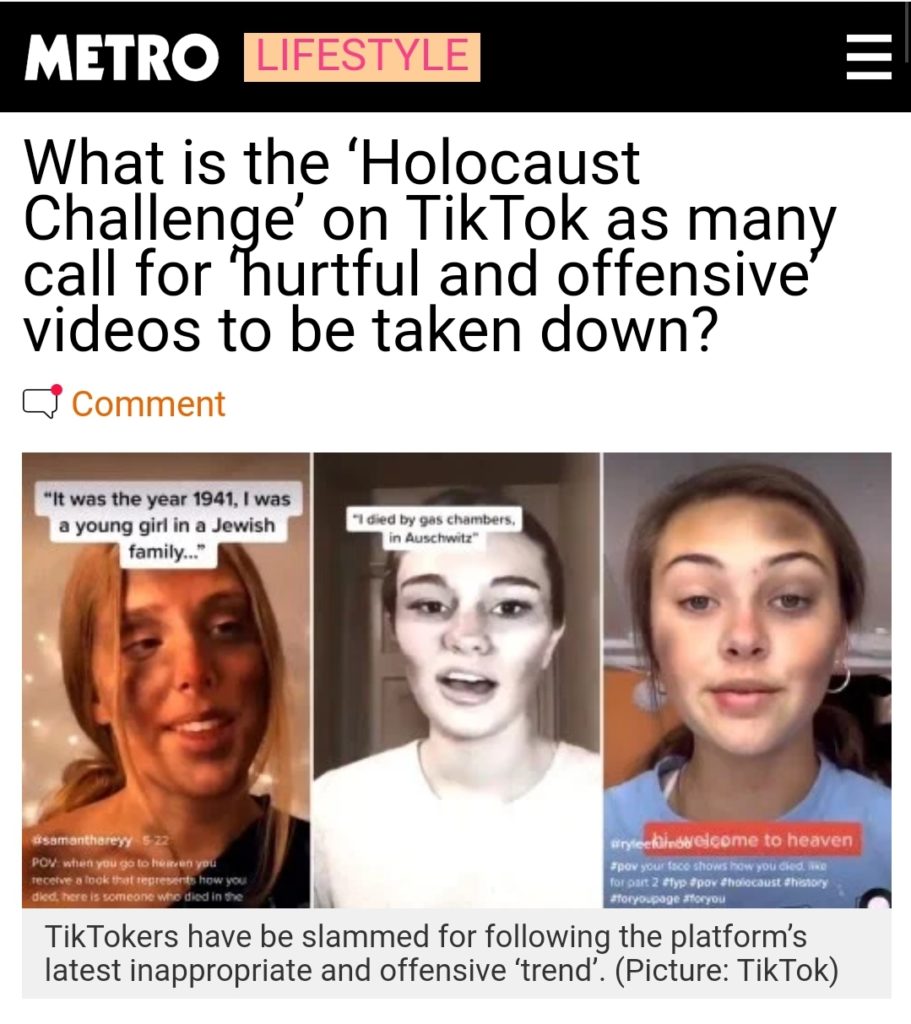
https://twitter.com/auschwitzmuseum/status/1108337507660451841?lang=en
https://twitter.com/AuschwitzMuseum/status/1192165956849717248/photo/2
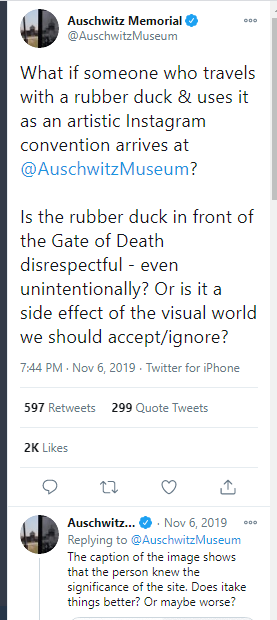

Example 23: Saying we have heard enough about the Holocaust:
The tweet below is hostile, suggesting that the world has heard enough about Jewish suffering, and asks ‘Does anyone think we have forgotten’? The fact is that the world has to a degree forgotten about the Holocaust. A 2020 survey of young people in the US showed that 63% of those surveyed did not know that 6 million Jews were murdered in the Holocaust, with over half of these thinking the death toll was fewer than 2 million. Nearly half of people surveyed could not name a single death camp. https://www.nbcnews.com/news/world/survey-finds-shocking-lack-holocaust-knowledge-among-millennials-gen-z-n1240031. And a 2018 UK study of school students showed similarly over a third of the students ‘dramatically underestimated’ the number who died, and many blamed Hitler without having a broader understanding of Nazi ideology. https://www.ucl.ac.uk/ioe/research-projects/2020/sep/what-do-students-know-and-understand-about-holocaust-evidence-english-secondary-schools. Holocaust education continues to be important both to show what antisemitism may lead to, and to show how racism and fascism can lead to unimaginable evil.
https://m.facebook.com/permalink.php?story_fbid=1965622760417805&id=100009102995321
